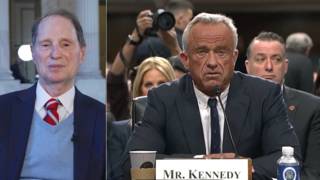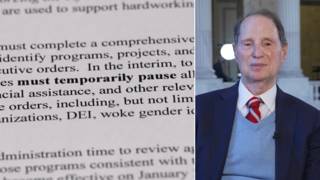
Related
Guests
- John Nicholspolitical writer for The Nation and the author of the new book, Uprising: How Wisconsin Renewed the Politics of Protest, from Madison to Wall Street.
The Republican presidential race appears headed for the long haul after the “Super Tuesday” slate of primaries failed to produce a decisive winner. Mitt Romney won six states, including what appears to be a slim victory over Rick Santorum in the main battleground state of Ohio. Santorum won three states, while Newt Gingrich won his home state of Georgia. Romney currently enjoys a sizable lead in delegates, with around one-third of the number needed for the nomination. “Nothing was settled last night. Far from it. In fact, last night actually gave at least a measure of encouragement to both Santorum and to Newt Gingrich,” says John Nichols, political writer for The Nation. [includes rush transcript]
Transcript
AMY GOODMAN: We turn now to look at some of the key races in yesterday’s Super Tuesday primaries. Mitt Romney appears to have won a slim victory over Rick Santorum in the main battleground state of Ohio. Altogether, Romney won six out of the 10 states, including Massachusetts, where he was formerly the governor, and Virginia, where his only competition on the ballot was Congress Member Ron Paul. He also won Vermont, Idaho and Alaska.
Despite collecting most of the delegates, Romney failed to secure the Republican presidential nomination. But when he thanked his supporters last night, he focused on the issue expected to be at the forefront of the general campaign—the economy—and his potential challenger, President Barack Obama.
MITT ROMNEY: He rejected the Keystone pipeline; I will approve it. You know, he has—he has stalled domestic energy production; I’m going to open up our lands for development so we can finally get the energy we need at a price we can afford. Look, when it—when it comes to the economy—
ROMNEY SUPPORTERS: Go, Mitt, go! Go, Mitt, go! Go, Mitt, go! Go, Mitt, go!
MITT ROMNEY: When it comes to this economy, my highest priority will be worrying about your job, not worrying about saving my job. And by the way, I’ve got a pro-growth tax plan, jobs plan, that’s going to jumpstart the economy. President Obama wants to raise your taxes; I’m going to cut them. That starts with an across-the-board 20 percent rate cut for every American. And by the way, I’m also going to repeal the alternative minimum tax, and I will finally abolish the death tax.
AMY GOODMAN: Republican presidential candidate Mitt Romney, addressing his supporters in Boston. His closest challenger, Rick Santorum, won in three contests: Tennessee, Oklahoma and North Dakota. Speaking in Ohio last night in Steubenville, he focused on his Christian conservative credentials.
RICK SANTORUM: Ronald Reagan, in his farewell address to the American people, worried about whether America would remember what made us great, that we are not a great country because we have a great and powerful government, we are a great country because we believe that rights don’t come from the government. But as in our founding document, the Declaration of Independence, says, our rights come to us from our creator.
AMY GOODMAN: That was Rick Santorum. He was speaking in Steubenville, Ohio. This is Democracy Now!, democracynow.org, The War and Peace Report. We are going to turn right now to Newt Gingrich—Newt Gingrich, who won only in his home state of Georgia.
NEWT GINGRICH: But it’s more than a chapter in the race for the nomination. It’s a chapter in a fight for the soul of the Republican Party. It’s a chapter in the fight for the very nature of America. It’s a chapter in defining who we are as a people. And let me be very clear: I believe that I am the one candidate who has the ability to debate Barack Obama decisively this fall.
AMY GOODMAN: Also competing in the Super Tuesday contest was Texas Congress Member Ron Paul, who had no primary wins. Still, he remained defiant on Tuesday night, rallying his supporters to overhaul the country’s monetary system.
REP. RON PAUL: What I’m talking about are real cuts, actually cutting. But you can’t do this unless you change policy. If you expect to have the entitlement system, have welfare benefits from cradle to grave, free housing, free food and free medical care and free education, you can’t do it. If you expect to continue to be the policeman of the world and advocate preemptive war and going into country and occupying countries, if you want that kind of foreign policy, you cannot do it. And you know what will happen if we don’t change policy? We are going to end up in a financial crash, there is going to be a dollar crisis, and we are all going to suffer the consequence.
AMY GOODMAN: In addition to yesterday’s Republican presidential primary, local races attracted many voters. In Ohio, Democratic Congress member and two-time presidential candidate Dennis Kucinich suffered a defeat in a newly drawn district against his once-close ally, Congress Member Marcy Kaptur. Kaptur will now face Samuel Wurzelbacher, winner of the district’s Republican primary. Wurzelbacher gained notoriety as “Joe the Plumber” during the 2008 presidential campaign, despite not actually being a licensed plumber.
And in a closely watched measure in Vermont, voters in more than two dozen towns said they want Congress to begin the process of changing the U.S. Constitution to ensure that corporations are not treated the same as people. Vermont could become the third state, after Hawaii and New Mexico, to endorse similar proposals.
Well, to discuss these results and more, we go to Washington, D.C., where we’re joined by reporter John Nichols, political writer for The Nation magazine.
John, welcome back to Democracy Now! Let’s talk about what has taken place on Super Tuesday. Romney takes six of 10 states, though he’s counting Ohio. Ohio is actually still counting.
JOHN NICHOLS: That’s right. In fact, the interesting thing about Ohio is that even if Romney wins it, the reality is, if a tiny number of votes, perhaps seven, eight thousand, had shifted, it would have gone to Santorum. Similarly in Alaska, if you had just a few hundred votes, Santorum would have won. So if you burrow into these results very far, you realize that Mitt Romney has really not had that good a Super Tuesday. In fact, the most striking result to me was that in Virginia, where he only faced Ron Paul, more than 40 percent of the people came out and voted for Ron Paul. Ron Paul actually carried a congressional district there. So, Romney’s still got quite a bit of work ahead of him to close this deal.
AMY GOODMAN: So talk about the significant states. Even Virginia, where Romney didn’t have that much competition, right?
JOHN NICHOLS: That’s right.
AMY GOODMAN: Santorum was not on the ballot. Gingrich was not on the ballot. They weren’t able to call it right afterwards. He was competing with Ron Paul.
JOHN NICHOLS: Yeah, it’s very striking. One of the things that is, I think, highly significant in Virginia—and it’s significant in a lot of these other states—is that turnout was exceptionally low. These Republican primaries are simply not exciting a lot of folks. They’re clearly getting the base out. I think that does inflate the Santorum vote, and to some extent, perhaps, the Ron Paul vote. But, I mean, overall turnout: very, very low. And as a result, in Virginia, one of the striking things is, Ron Paul did fabulously in college towns. He carried some college towns. He ran very, very competitively in others. And there’s a pretty good indication there that he got a decent antiwar vote out of Virginia, or simply just an anti-political-orthodoxy vote. But still, getting to 40 percent there against the guy who is the presumed front-runner and the guy who had the support of all of the Virginia Republican establishment, including the governor, Congressman Cantor, others, that’s striking to me. The other striking thing is that in a number of other states where Romney put significant effort in, he still didn’t get to anywhere near 50 percent, even though in states like Vermont his opposition was not active. It was really basically Romney put an effort in, and yet he still was held to relatively low percentages, especially for a front-runner this late in the race.
AMY GOODMAN: And then talk about Tennessee. I mean, Harold Ford, who had lost for Senate, but who was a Congress member from Tennessee, had predicted that this was easy for Romney. But in fact, Santorum took Tennessee.
JOHN NICHOLS: Not only did Santorum take Tennessee by a very comfortable margin—and you’re right—well, this is—I think maybe back up a second here. People need to understand where the punditocracy, where the sort of political elites, both in the media and in the political class, were 24 hours ago. Twenty-four hours ago, they were saying, “Mitt Romney is going to close the deal on Super Tuesday. He’ll win Ohio. He’ll win Tennessee. He’ll do well in all these other states.” It was quite the opposite last night. He struggled for Ohio. He really got beaten badly in Tennessee. And the interesting thing about Tennessee is, not only did Santorum win it, but Gingrich did very, very well there. What it really means is that, particularly in your mid-South and Southern states, which are core Republican states, there’s a striking level of discomfort with and even outright opposition to Mitt Romney. That’s why Newt Gingrich and Rick Santorum, and of course Ron Paul, are going to continue in this race for quite a long time. Nothing was settled last night. Far from it. In fact, last night actually gave at least a measure of encouragement to both Santorum and to Newt Gingrich, and each of them can look down the line into the coming weeks and see states that they can win.
AMY GOODMAN: Although Santorum did not specifically name Romney, he attempted to distinguish himself from his opponent by referring to what some would call Obamacare and Romneycare.
RICK SANTORUM: This is an election about fundamental liberty, and the signature piece, the signature piece of legislation, that points this out, where you have economic rights created by the government, and then the government using its heavy hand to force you to buy insurance, to force you to take policies that you don’t want, and of course to force you to take coverages that may even violate your faith convictions. In this race, there is only one candidate who can go up into the most important issue of the day and make the case, because I’ve never been for an individual mandate, at a state or federal level.
AMY GOODMAN: John Nichols, your response?
JOHN NICHOLS: Well, this is really the nightmare for Mitt Romney. It is the ongoing race in which his conservative opponents heighten the criticism of Romney as being indistinguishable from Barack Obama on core issues. This becomes a real problem for Romney at two levels. First off, it reduces the enthusiasm for him on the part of the base, if and when he is nominated. At the same time, he is taking hits by being a part of a race that seems to be particularly demeaning to women, particularly theocratic, which this country still has a good deal of discomfort with. And so, what we see is that every day Mitt Romney is sort of dragged into a place that he doesn’t want to be in.
We’ve seen this in the past in politics. If you go back a long time ago, to 1972, George McGovern was clearly going to be the Democratic nominee, but he was dragged through a multi-month race with Hubert Humphrey. And as Humphrey began to see that he wasn’t going to win, but was still very angry about that, he kept saying more and more negative things about McGovern. At the end of that race, McGovern was severely damaged, going into the fall contest with Richard Nixon. My sense is that if this Republican race carries on in the same way, there is a real chance that Mitt Romney does get very badly damaged here. That’s why the Republican establishment is so desperate to end this contest. They tried very, very hard, with a series of endorsements, as well as a lot of other pressure, to end it on Super Tuesday. That did not happen. And so, this race will go on at least for another month. And that is—that’s exactly what Mitt Romney doesn’t want.
One of the most telling details of yesterday was a new poll that came out that showed that women are trending more and more toward Barack Obama. There’s a real reopening of the gender gap, and that’s going to harm Romney. And the reason it harms him is, in part, because he’s stuck in a race where he’s competing with candidates who are saying things about contraception and a host of other issues that simply are not going to—not going to sit Romney well, having come out of that race, in a November contest with Obama.
AMY GOODMAN: Romney tried to portray Obama as insensitive to the plight of the unemployed.
MITT ROMNEY: For this administration, the unemployment number is just another inconvenient statistic standing in the way of a second term. But those numbers are more than data on a spreadsheet. They’re worried families and anxious faces. And tonight, I’d like to say to each of them: You are not forgotten. We will not leave you behind. Our campaign is on the move, and real change is finally on the way.
ROMNEY SUPPORTERS: Yeah! We need Mitt! We need Mitt! We need Mitt! We need Mitt! We need Mitt! We need Mitt! We need Mitt! We need Mitt!
MITT ROMNEY: These times—these times may be tough, but our citizens still believe in the promise of America, and they deserve a president who believes in them. That’s why our campaign is about more than just replacing a president. It’s about restoring America’s promise. And we will do it.
AMY GOODMAN: Romney’s wife Ann recently drew some headlines after she said, “I don’t even consider myself wealthy.” The Romneys are worth at least $250 million. Mitt Romney also recently faced a backlash after he said his wife drove a couple of Cadillacs.












Media Options